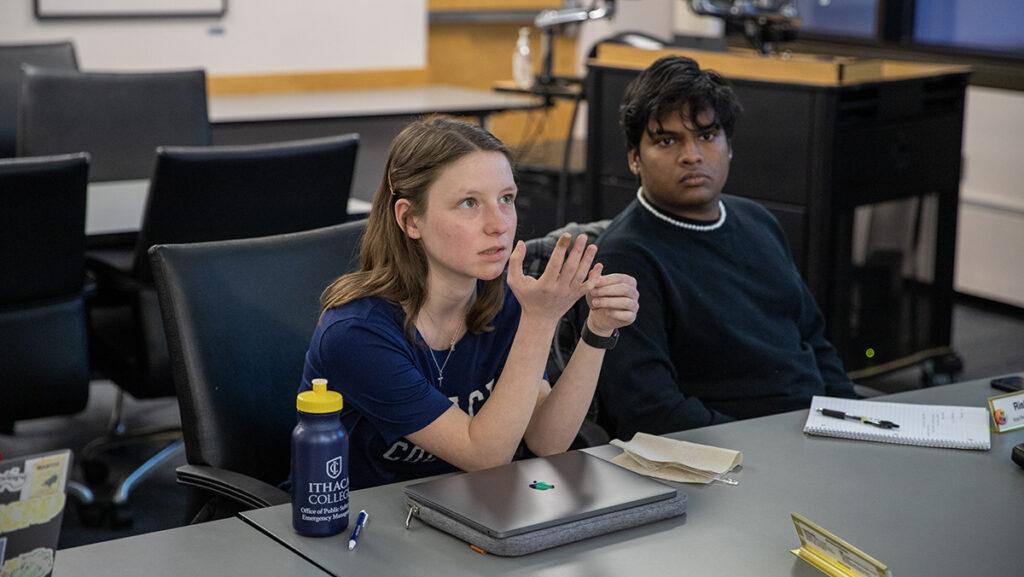At Ithaca College Student Governance Council’s March 20 meeting, senators and officials discussed the SGC’s schedule for the rest of the semester, and prepared for discussing an upcoming bill.
Because of missing senators, the SGC was unable to approve minutes for last week. Most students expected a meeting at President La Jerne Cornish’s residence for dinner during this meeting. This was seen to be a chance for the president to connect with SGC and its members. Senate Chair senior Austin Ruffino said the meeting was postponed because of miscommunication about when the event would be held.
“As soon as I am given information that is definite about the meeting you [SGC] will be informed, but at the moment, we have not been given that,” Ruffino said. “For all intents and purposes, this [meeting with the president] is a mandatory SGC meeting.”
Senior Grace Madeya, president of the student body, held a personal meeting with Cornish to discuss IC Rise Up. One topic brought up was IC Rise Up and Cornish’s ongoing goal of finding a satisfactory conclusion between IC Rise Up and the college.
“[Cornish] did mention she went to the walkout and that she did talk to six members who are a part of IC Rise Up,” Madeya said. “They are going to come to her with a list of demands so she is waiting to see them and then take action.”
Cornish was invited as a guest at the March 6 SGC meeting. This meeting heavily discussed IC Rise Up and the president’s attempted solutions. Cornish’s idea was to have listening sessions to properly get students’ input directly to faculty. Although IC Rise Up said at its March 8 walkout that it would boycott Cornish’s focused sessions to listen to student’s discussed in the printed statements, Madeya said the events will be well attended.
“[Cornish] has the next three listening sessions with the provost where thirty people have signed up,” Madeya said. “This means they are both completely full.”
Senior Maya Scriven, vice president of communications, followed up on several topics previously discussed at prior meetings. This includes vending machines in Towers and improving water fountains across campus. The SGC tried to see if issues it is discussing are already in the process of being handled by the college, but Scriven said she is not getting answers.
“I want answers on stuff such as the vending machines and other things,” Scriven said. “I’ve sent a lot of Gmails but haven’t gotten a lot of responses back. … A lot of people don’t answer over break.”
First-year student Rishabh Sen, vice president of campus affairs, announced IC After Dark’s upcoming event, the Spring Fair. Madeya said she sees this event as a chance for the SGC to have a panel and further connect with students. Madeya said she does not yet know if a panel will happen or what one would look like.
Ruffino talked about the Educational Technology Advisory Committee. This board decides what technological programs the college uses in its teaching. Ruffino, who is graduating and thus vacating the role, said the position is open and emphasized the importance of the committee.
“This committee supervises programs such as DegreeWorks, Canvas, even programs such as Kahoot and Top Hat,” Ruffino said. “I have been on it since it was created, but I am graduating … I would love to bring someone to the next meeting with me.”
Madeya said the Code of Conduct amendment is now in the SGC’s constitution. Any members wanting to join must first read and agree to this amendment. This amendment is the first and only passed by SGC this academic year.
“It is now a part of the elections,” Madeya said. “You must agree to it before you run.”
Finally, as previously discussed in the bill-writing workshop that was held during the Feb. 27 meeting, Madeya continued to push her bill to add more seats to the SGC. Madeya said discussions about this bill will continue at the next meeting.
“This bill is about adding an Ex-Officio Member for the Student of Color Coalition and a First Generation Student seat on the council,” Madeya said. “In doing research, about 15% of students identify as first generation students, so it’s important they have representation specifically related to their own college experience, and the same goes with a liaison for the Student of Color Coalition … just to ensure we are hearing all voices and listening to what Student of Color organizations need.”









